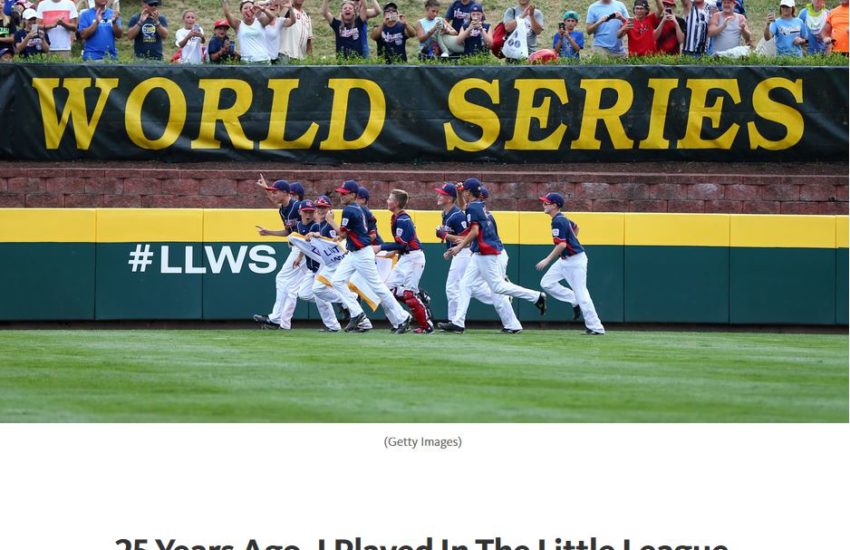WRD instructor Justin Staley’s article “25 Years Ago, I Played In The Little League World Series, Too” was recently published in The Cauldron by Sports Illustrated. In the article, Staley recalls his experiences playing in the Little League World Series championship and reflects on what he’s learned from that memorable summer. We were able to get in touch with Staley and learn more about the article and his reasons for writing it. Want to read Staley’s work? Find it here.
Why did you write this piece? Did any recent event or thought trigger a desire to write about yourself and the Little League World Series, or has the idea been brewing in your mind for a while?
I started writing this piece about two years ago. After it got rejected from a couple of journals, I decided to set it aside and come back to it with a fresh pair of eyes some time later. Over the summer was the 25th anniversary of playing in the LLWS, so I decided to start working on it again. This time I decided to cut it down significantly and submit it to more regular periodicals like newspapers and sports websites.
While you were writing, what was most rewarding and most challenging for you?
I’ve always thought it was a good story to tell, so for me the most rewarding part about it was just sitting down and writing it. The biggest challenge was cutting the piece down to 2,000 words considering the first draft was around 6,000 when I wrote it. It was difficult figuring out what needed to be told and what I should keep for myself. I wanted to tell everything, but I had to be damn picky about what made the final draft.
On a similar note, did you learn anything from writing this story?
It’s allowed me to crystallize thoughts in my head. I’ve always known I had mixed feelings about that summer, or more specifically about that summer and what happened after it. More than anything it was an opportunity to bridge a gap between who I was then and who I am now. I think I might raise more questions than I answer, but somehow it seems like that’s part of the point. I’m not claiming to know exactly what it meant.
In your piece, you touch on ideas/themes such as the power of memory, how selective our remembrances can be, and how sports can “provide us with a simplified way of looking at the world.” Do you address similar topics in WRD 284: Sports Writing in America? If so, how?
I’ve always been fascinated with the power and inconsistencies of memory—not only the incredible inconsequential details or moments we remember yet have no idea why, but also how we remember things we’ve experienced. Truth is subjective in memories. Sometimes we change what really happened to fit what we wanted to happen, or maybe more importantly, how we want to remember it. We see things differently because we want them to mean something that fits our larger narrative, especially our concepts of who we wish we were, or who we’d like to be. I think it’s important to understand that in personal essay writing in order to get rid of the ego of memory. Once you realize your memory is imperfect, you can write about yourself and your memories from a more detached perspective, and you can start to see that you’re imperfect too.
It’s funny about this essay. When I first wrote it, which was probably around the time I started teaching WRD 284, it was 25 pages, and a great deal of that was about the games, what happened on the field. This last summer when I came back to work on it, I realized that I was giving a lot of game summary, as if my audience would want to hear about the tension of eight or nine little league games they’d never think of again. One of the things I emphasize in WRD 284 is that the best, most resonant stories about sports aren’t really about what happens on the field. They’re not about the games, but about what the story means, what sports serve as a microcosm for, and how we use them to discuss larger social or economic or racial issues that we can’t get focusing on scores and statistics. And I thought, damn, here I am for the last couple years telling my students not to write too much about the games because that’s only interesting to you, and yet, I’m not practicing what I preach. Once I realized that, I had a much clearer picture about which parts were essential to the story, which weren’t, and how the story needed be told.
